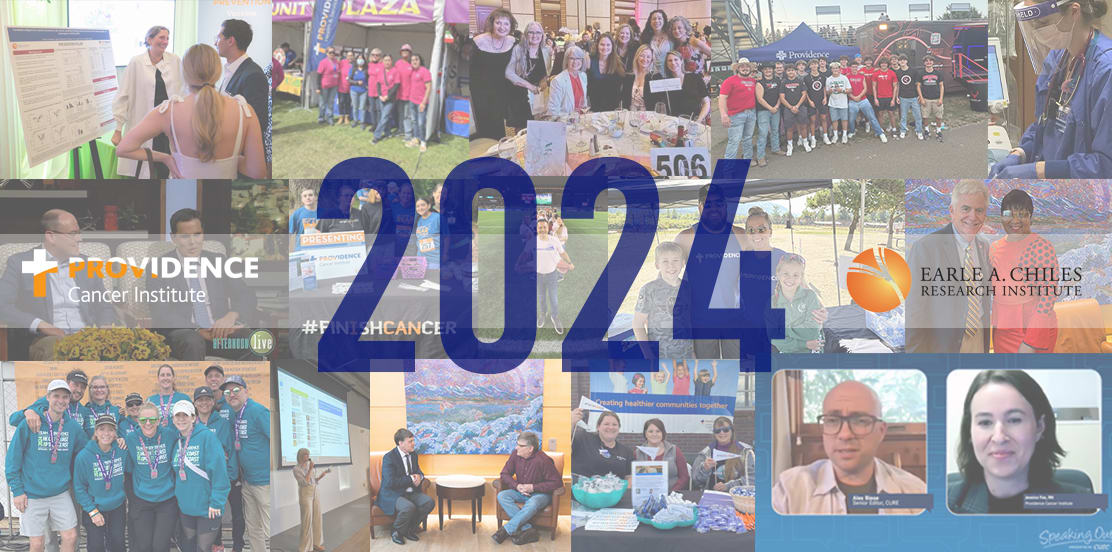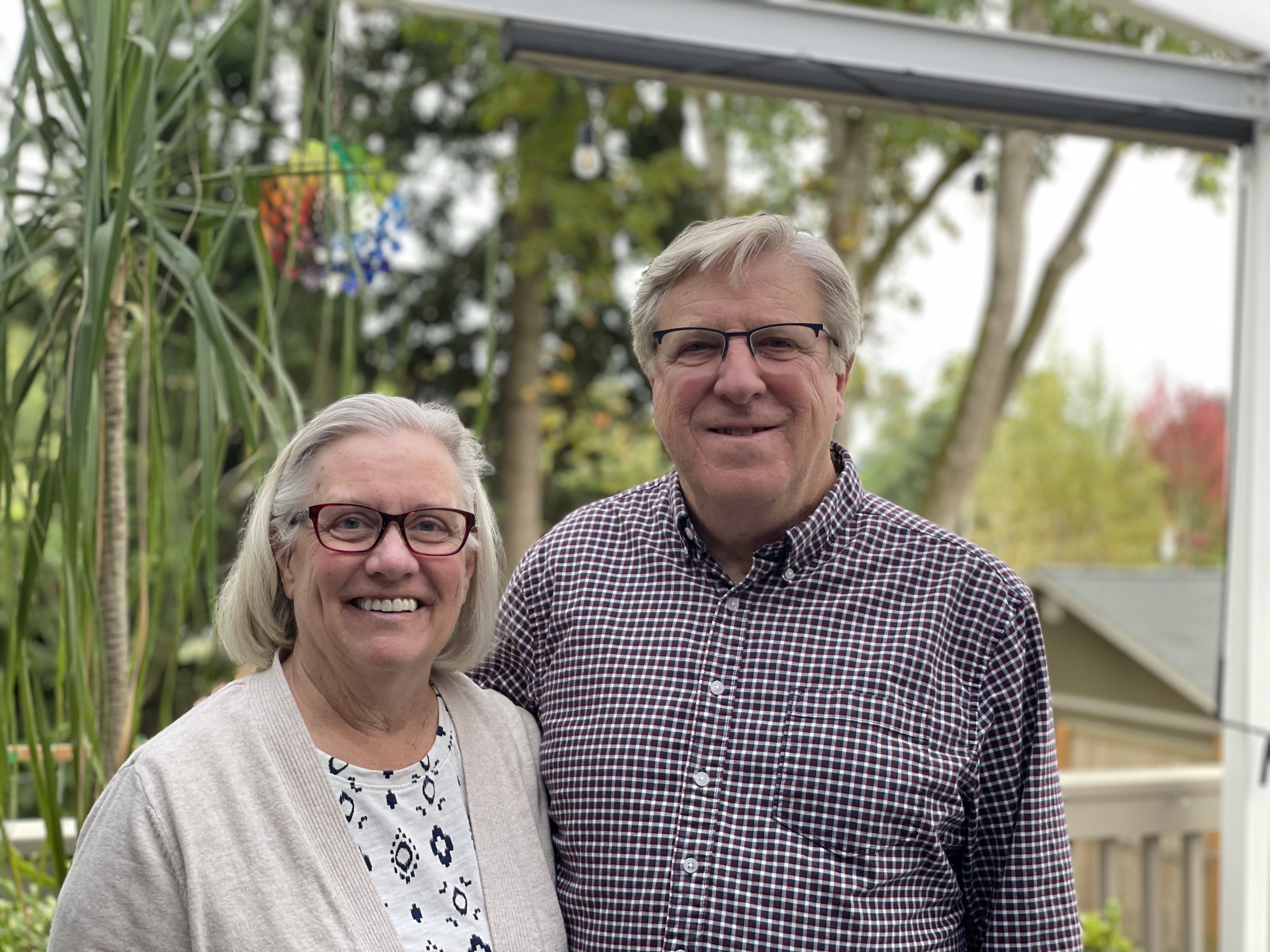Immunotherapies evaluated in new trials for AML, melanoma and solid tumor cancers
Acute myeloid leukemia or AML, a type of aggressive cancer of the blood, is most often treated with chemotherapy to send the cancer into remission. However, because of age or overall health, a person with AML may require other types of therapies instead of or in addition to chemotherapy.
A new clinical trial at Earle A. Chiles Research Institute, a division of Providence Cancer Institute of Oregon, will evaluate the safety and efficacy of magrolimab compared with placebo in combination with standard chemotherapy as first-line treatment in patients with newly diagnosed, untreated AML who are ineligible for intensive chemotherapy.
Magrolimab can inhibit recognition of CD47
In this phase III, double-blind study, known as ENHANCE-3, one randomized group will receive the immunotherapy magrolimab in combination with venetoclax and azacytidine, while the other randomized group will receive a placebo in combination with venetoclax and azacytidine.
-
Magrolimab is a humanized monoclonal antibody that blocks the immune checkpoint CD47, a "do not eat me" signal, that is overexpressed on tumor cells.
-
Venetoclax is a B-cell lymphoma-2 (BCL-2) inhibitor. It may stop the growth of cancer cells by blocking Bcl-2, a protein needed for cancer cell survival. Venetoclax comes in tablet form, taken by mouth.
-
Azacytidine is a chemotherapy medication that interferes and prevents changes in DNA, thereby preventing uncontrolled growth of cancer cells.
In a phase I/II trial presented during the 2022 American Society of Hematology Annual Meeting, magrolimab plus azacitidine and venetoclax produced promising response rates and was tolerated well among patients with high-risk AML.
Patients eligible for this trial need to have newly diagnosed untreated AML. They can be either over the age of 75 or under the age of 75 with comorbid conditions that make them ineligible for intensive chemotherapy. A bone marrow biopsy is required at screening. See the clinical trial details for all eligibility criteria.
The principal investigator of this study at Earle A. Chiles Research Institute is Natasha Edwin, M.D., Providence Cancer Center Oncology & Hematology Care Clinic.
Learn more about the study:
Triple combination therapy study opens to melanoma patients
May is Melanoma Awareness Month and in honor of those touched by this pervasive type of cancer we present an investigator-initiated clinical trial for people with metastatic cutaneous melanoma. This study, sponsored by Earle A. Chiles Research Institute, will evaluate the efficacy of triple combination therapy for patients who are unresponsive to standard immunotherapy.
Two immunotherapies plus kinase inhibitor
Ipilimumab and nivolumab are immunotherapies that work by boosting the immune system. Earlier trials with ipilimumab alone and in combination with nivolumab have shown a clinical benefit in patients with melanoma, renal cell carcinoma, non-small cell lung cancer and other cancers.
Cabozantinib is a kinase inhibitor that works by blocking abnormal proteins that signal cancer cells to multiply and spread. Blocking these proteins helps kill cancer cells and slow the spread of tumors.
The combination of kinase inhibitors with immunotherapy can be very effective in treating advanced cancers, such as endometrial and kidney cancers. This new clinical trial will determine if the triple combination also is effective in treating people with advanced melanoma.
Eligible participants
This phase II clinical trial is open to eligible adults with a confirmed diagnosis of metastatic cutaneous melanoma. The triple combination therapy will be given over 24 months or until either the melanoma grows or spreads, or the study participant experiences an unacceptable drug-related toxicity.
Matthew Taylor, M.D., co-medical director, Providence Melanoma Program, and medical director, Providence Thyroid Cancer Program, is the principal investigator of the study. This trial is open and enrolling patients.
Learn more about the study:
First dosing study with HST-1011
One of the limitations of immunotherapy is the resistance of some tumors to treatment. In many other cases, tumors may respond but then rebound and resume growing.
In a new phase I/II study offered at Earle A. Chiles Research Institute, the investigational small molecule allosteric inhibitor of CBL-B, known as HST-1011, will be evaluated alone and in combination with an anti-PD-1 antibody – cemiplimab – to determine its ability to activate a targeted anti-tumor immune response.
This study, known as SOLAR1, is open to patients with advanced solid tumors that are relapsed on or are refractory to anti-PD(L)-1 or standard of care therapies.
HST-1011: Orally bioavailable
HST-1011 can bind to and inhibit a natural hotspot on CBL-B, a gatekeeper in immune cell activation. By inhibiting CBL-B in this way it may be easier for immune cells to become activated and less susceptible to suppression in the regions around the cancer. HST-1011 is given orally.
Cemiplimab (cemiplimab-rwlc) is an immune checkpoint inhibitor that works by binding to the protein PD-1. Cemiplimab is used to treat squamous cell skin cancer and recently has received approval from the Food and Drug Administration for first-line treatment of advanced non-small cell lung cancers that have high levels of PD-L1. The medication is given via intravenous infusion.
Multi-arm study
This study has two arms of phase I, which includes dose escalation of HST-1011 alone and in combination with cemiplimab. Phase II will evaluate the efficacy of the combination of medications based on the recommended dosage learned in phase I.
Rachel E. Sanborn, M.D., medical director of the Providence Thoracic Oncology Program and of the Phase I Clinical Trials Program, is the principal investigator. Providence is the only site on the West Coast offering the trial.
Get the full details of the study:
How to refer a patient
To refer a patient to one of these clinical trials:
- Call 503-215-2614
- Submit a referral form
- Send an email
New research studies are added frequently. To see more clinical studies, visit:
- Studies for many types of cancer and advanced cancers
- All cancer studies at Providence Cancer Institute
Providence Center of Excellence for precision immuno-oncology and cellular therapy

Our main area of research is cancer immunotherapy, and with the advancements in genomic sequencing, we are bringing together the power of immunotherapy and personalized medicine to accelerate leading-edge research and groundbreaking discoveries for patients with cancer.
Learn more about the latest research and clinical trials at the Earle A. Chiles Research Institute.
Related news
Register for a free virtual cancer nutrition class
AACR Project GENIE: Making an impact worldwide in cancer research and precision medicine
Providence among few sites worldwide offering new trials for solid tumors and lung cancer




